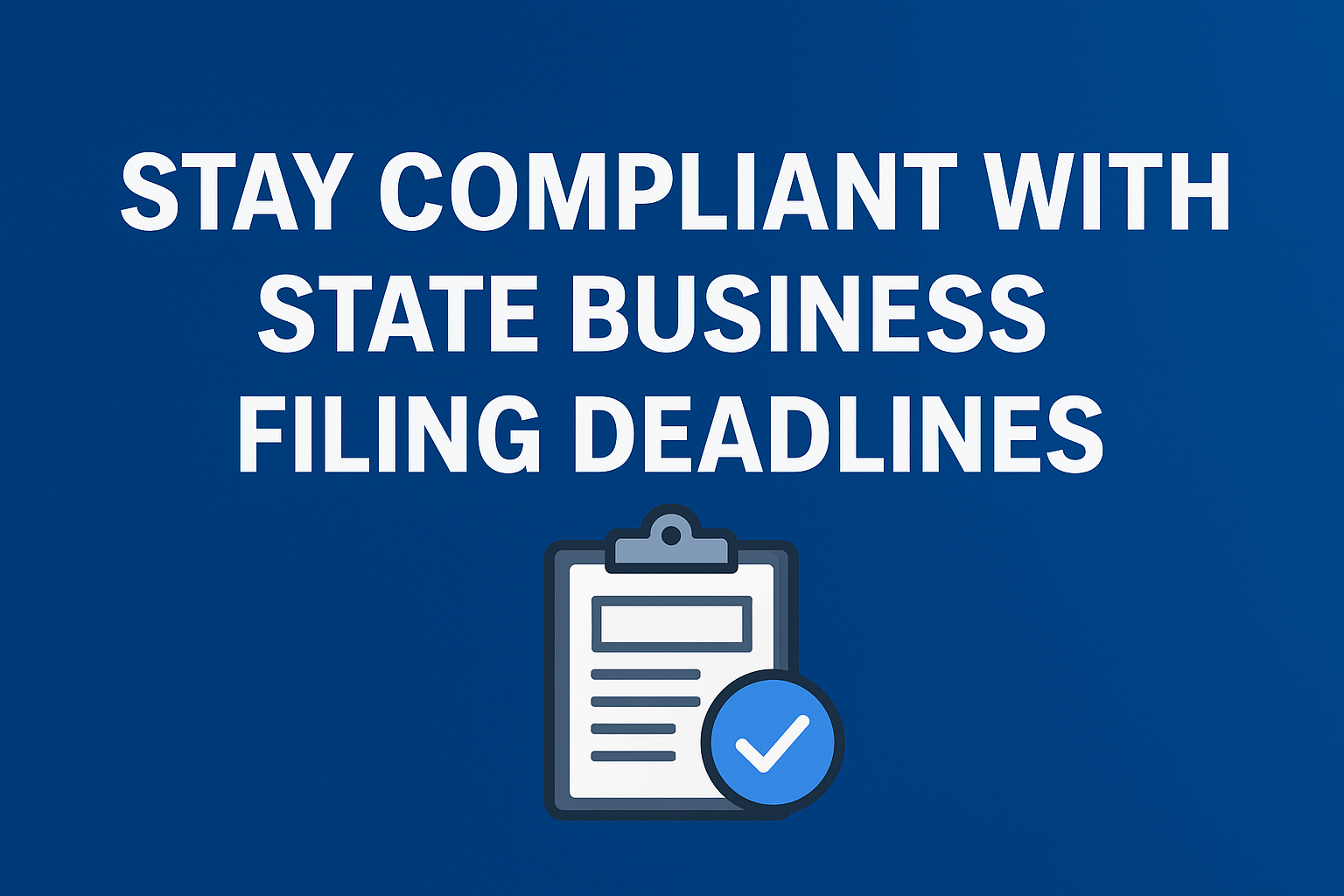 Keeping up with your state business filing deadlines is a crucial part of running a legitimate, successful company. Whether you own an LLC or a corporation, meeting compliance requirements ensures your business remains in good standing and helps you avoid costly late filing penalties.In this guide, we’ll break down what business compliance means, common state filing requirements, how to track your deadlines, and the benefits of using a compliance service to stay organized.
Keeping up with your state business filing deadlines is a crucial part of running a legitimate, successful company. Whether you own an LLC or a corporation, meeting compliance requirements ensures your business remains in good standing and helps you avoid costly late filing penalties.In this guide, we’ll break down what business compliance means, common state filing requirements, how to track your deadlines, and the benefits of using a compliance service to stay organized.
What Business Compliance Means (and Why It Matters)
Business compliance refers to following your state’s rules for maintaining an active business entity. Every state requires certain filings like annual reports, business license renewals, and updates to ownership or address to keep your company in good standing.
Ignoring compliance requirements can lead to fines, administrative dissolution, or even loss of liability protection. Staying compliant helps you:
-
Keep your LLC or corporation legally recognized
-
Maintain eligibility for financing and contracts
-
Protect your personal and business assets
Common State Filing Requirements for LLCs and Corporations
Each state has its own list of required filings, but most small businesses will encounter these core compliance obligations:
-
Annual or Biennial Reports – Updates ownership, address, and registered agent information.
-
Business License Renewals – Ensures your company remains authorized to operate in its industry.
-
Franchise Tax Reports – Required in some states to calculate and pay annual business taxes.
-
Registered Agent Maintenance – You must have a current agent to receive official documents.
-
Amendments or Changes – Notify the state if you change your business name, structure, or officers.
➡️ Learn more about how to file your report through our Annual report filing service.
Annual Report and License Renewal Deadlines Explained
Most states require annual reports to be filed on or before a specific date each year. This might be:
-
The anniversary date of your formation, or
-
A fixed calendar date (like April 15th or June 30th).
In addition, certain industries or cities may require business license renewals at different times of the year. Missing a renewal deadline could result in suspension of your license or additional fees.
How to Track Your Filing Dates Easily
Tracking multiple compliance dates across states can be confusing, especially if you manage several business entities. Here are a few ways to stay on top of deadlines:
-
Create a Compliance Calendar – List all key dates and set reminders a few weeks in advance.
-
Use Software Tools – Many platforms automate business renewal reminders and report filings.
-
Work with a Professional Service – Outsourcing to a compliance team ensures nothing slips through the cracks.
Penalties for Missing Compliance Deadlines
Missing state filing deadlines can have serious consequences:
-
Late Fees or Fines – States often charge escalating penalties for overdue reports.
-
Administrative Dissolution – Your business may be dissolved, losing its legal protection.
-
Loss of Good Standing – You could be barred from securing loans or contracts.
Reinstating a dissolved business is possible, but it’s costly and time-consuming. Staying proactive is always easier.
Using a Compliance Service to Stay Organized
A business compliance management service can automate filings, monitor due dates, and file reports on your behalf. These services help ensure:
-
Timely submissions
-
Reduced administrative stress
-
Continuous good standing with the state
By letting experts handle your compliance, you can focus on what really matters—growing your business.
➡️ Keep your company on track with our coconsultant Team .
FAQs
1. What are the most common business filing requirements?
Most states require an annual report, business license renewal, and maintenance of a registered agent.
2. How often do I need to file reports with the state?
Typically once per year, though some states require biennial (every two years) filings.
3. What happens if I miss a filing deadline?
You may face late penalties, loss of good standing, or administrative dissolution.
4. How can I automate compliance reminders?
You can use digital tracking tools or a professional compliance service to automatically notify you of upcoming deadlines.



